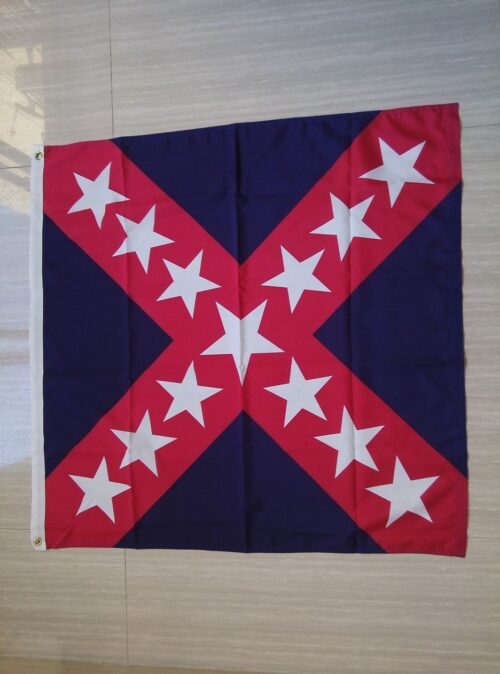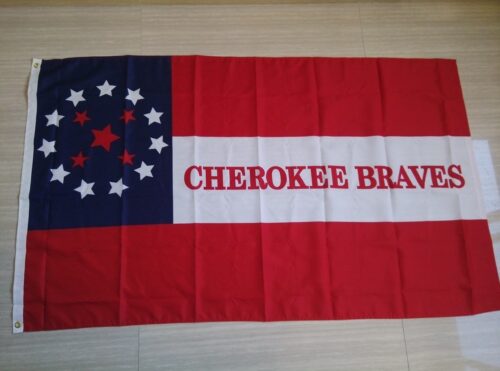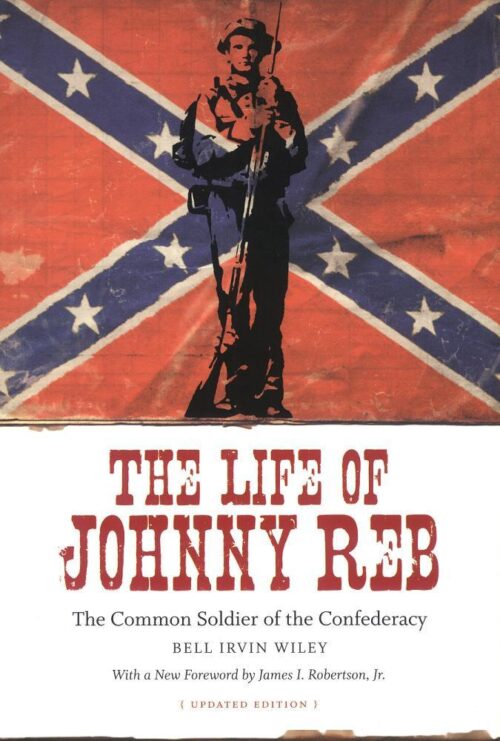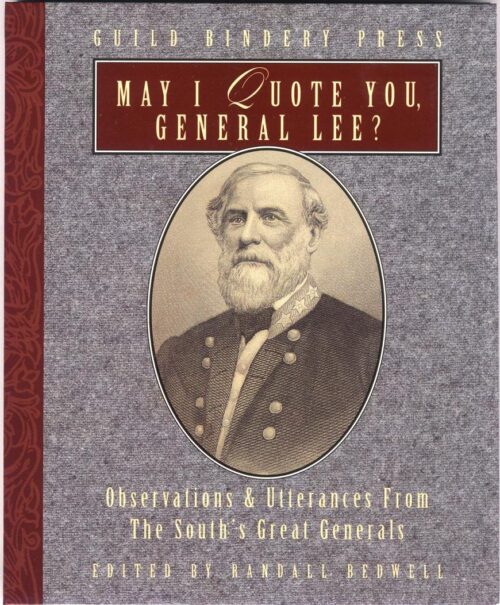-

 1.75" in diameter coin features the SCV logo on the obverse with "Sons of Confederate Veterans - Established 1896". A relief rendering of a Confederate veteran and his WWI soldier son with a UCV button and the SCV logo with inscription "From a rich tradition of honor since 1896 - Sons of Confederate Veterans, on the reverse.
1.75" in diameter coin features the SCV logo on the obverse with "Sons of Confederate Veterans - Established 1896". A relief rendering of a Confederate veteran and his WWI soldier son with a UCV button and the SCV logo with inscription "From a rich tradition of honor since 1896 - Sons of Confederate Veterans, on the reverse. -
 3rd National Flag originally adopted to replace the "Stainless Banner" on March 4,1865. This was also reverently called the "Blood Stained Banner". Standard 3'x5' polyester with 2 grommets or Large 5'x7.5' G-Spec super polyester with 3 grommets and 4 rows of stitching on the end for long life outdoor wear.
3rd National Flag originally adopted to replace the "Stainless Banner" on March 4,1865. This was also reverently called the "Blood Stained Banner". Standard 3'x5' polyester with 2 grommets or Large 5'x7.5' G-Spec super polyester with 3 grommets and 4 rows of stitching on the end for long life outdoor wear. -
 Polyester 3'X5'. General Leonidas Polk was the Episcopalian Bishop of Louisiana, a Confederate Lt. Gen. and Corps Commander in the Army of Tennessee. Killed during the Atlanta Campaign of 1864, the entire Army of Tennessee mourned his death. This distinctive design consisting of white and red Crosses of St. George on a royal blue flag was carried by the regiments in the Polk Corps.
Polyester 3'X5'. General Leonidas Polk was the Episcopalian Bishop of Louisiana, a Confederate Lt. Gen. and Corps Commander in the Army of Tennessee. Killed during the Atlanta Campaign of 1864, the entire Army of Tennessee mourned his death. This distinctive design consisting of white and red Crosses of St. George on a royal blue flag was carried by the regiments in the Polk Corps. -
 Companion book to the book "I'll Take My Stand: The South and the Agrarian Tradition" first published in 1930. In “To Live and Die in Dixie” you will find 27 essays which are designed to supply the weapons needed to take on the intellectually challenged and misinformed purveyors of modern historical imbecility. Intelligence is a weapon of self-defense. If you don’t know your own history then you will be helpless and ignorant before someone who merely claims to know your history! Originally published in the Confederate Veteran magazine from September/October 2010 through November/December 2014.
Companion book to the book "I'll Take My Stand: The South and the Agrarian Tradition" first published in 1930. In “To Live and Die in Dixie” you will find 27 essays which are designed to supply the weapons needed to take on the intellectually challenged and misinformed purveyors of modern historical imbecility. Intelligence is a weapon of self-defense. If you don’t know your own history then you will be helpless and ignorant before someone who merely claims to know your history! Originally published in the Confederate Veteran magazine from September/October 2010 through November/December 2014. -
 H. W. Johnstone explains how Lincoln and his co-conspirators used deceit, half-truths, lies and violation of international law to promote their war conspiracy. Johnstone wrote his book in 1917 using documentation which was not available when post war Confederates such as Davis, Stephens, Semmes and Pollard wrote their histories of the conflict.
H. W. Johnstone explains how Lincoln and his co-conspirators used deceit, half-truths, lies and violation of international law to promote their war conspiracy. Johnstone wrote his book in 1917 using documentation which was not available when post war Confederates such as Davis, Stephens, Semmes and Pollard wrote their histories of the conflict. -
 Gumps! Wharf Lice! Ditch Hunters! Though it’s reasonably clear that those terms are insults, few people today have any idea what they mean. Like much of the language used in the 1860’s, these expressions have vanished from everyday speech. This comprehensive volume will delight the historian, the writer, and the reenactor. Now in paperback.
Gumps! Wharf Lice! Ditch Hunters! Though it’s reasonably clear that those terms are insults, few people today have any idea what they mean. Like much of the language used in the 1860’s, these expressions have vanished from everyday speech. This comprehensive volume will delight the historian, the writer, and the reenactor. Now in paperback. -
 Leonidas Polk is one of the most fascinating figures of the Civil War. Consecrated as a bishop of the Episcopal Church and commissioned as a general into the Confederate army, Polk’s life in both spheres blended into a unique historical composite. Polk was a man with deep religious convictions but equally committed to the Confederate cause. He baptized soldiers on the eve of bloody battles, administered last rites and even presided over officers’ weddings, all while leading his soldiers into battle.
Leonidas Polk is one of the most fascinating figures of the Civil War. Consecrated as a bishop of the Episcopal Church and commissioned as a general into the Confederate army, Polk’s life in both spheres blended into a unique historical composite. Polk was a man with deep religious convictions but equally committed to the Confederate cause. He baptized soldiers on the eve of bloody battles, administered last rites and even presided over officers’ weddings, all while leading his soldiers into battle. -
 Sent to the United States as a war correspondent for the Illustrated London News, Frank Vizetelly quickly found himself in hot water with the Federal secretary of war when his depictions of Bull Run hit the papers. He was forbidden access to the Union army, so he took up with the Confederates instead, covering the Civil War from Charleston to the Mississippi and north to Virginia.His articles and sketches shaped the views of the English regarding the war.
Sent to the United States as a war correspondent for the Illustrated London News, Frank Vizetelly quickly found himself in hot water with the Federal secretary of war when his depictions of Bull Run hit the papers. He was forbidden access to the Union army, so he took up with the Confederates instead, covering the Civil War from Charleston to the Mississippi and north to Virginia.His articles and sketches shaped the views of the English regarding the war. -
 The commander of the three-hundred-wagon Union supply train never expected a large ragtag group of Texans and Native Americans to attack during the dark of night. But Brigadier Generals Richard Gano and Stand Watie defeated the unsuspecting Federals in the early morning hours of September 19, 1864, at Cabin Creek in the Cherokee nation. The legendary Watie, the only Native American general on either side, planned details of the raid for months. His preparation paid off--the Confederate troops captured wagons with supplies that would be worth more than $75 million today.
The commander of the three-hundred-wagon Union supply train never expected a large ragtag group of Texans and Native Americans to attack during the dark of night. But Brigadier Generals Richard Gano and Stand Watie defeated the unsuspecting Federals in the early morning hours of September 19, 1864, at Cabin Creek in the Cherokee nation. The legendary Watie, the only Native American general on either side, planned details of the raid for months. His preparation paid off--the Confederate troops captured wagons with supplies that would be worth more than $75 million today. -
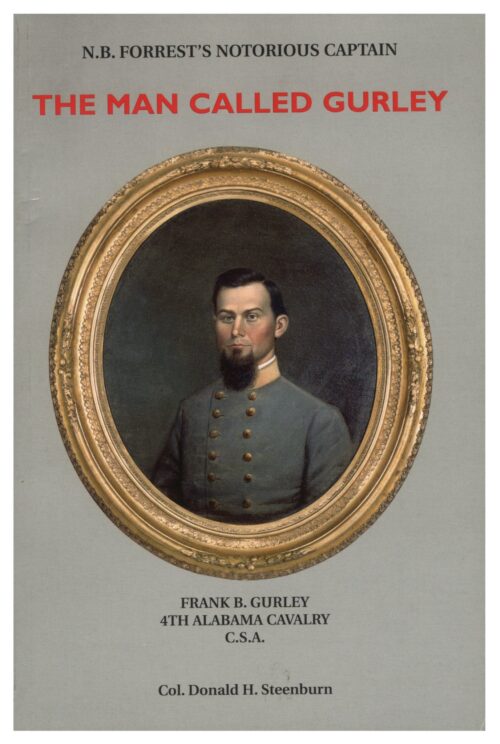 Hero? Traitor? It all depends on which side of the fence you were standing. Col. Don Steenburn, U.S.Army retired, has put together a fascinating study of one of the most controversial characters in Madison County and Northern Alabama history- determined and gutsy Frank Ballou Gurley of the 4th Alabama, Confederate States of America.
Hero? Traitor? It all depends on which side of the fence you were standing. Col. Don Steenburn, U.S.Army retired, has put together a fascinating study of one of the most controversial characters in Madison County and Northern Alabama history- determined and gutsy Frank Ballou Gurley of the 4th Alabama, Confederate States of America.



